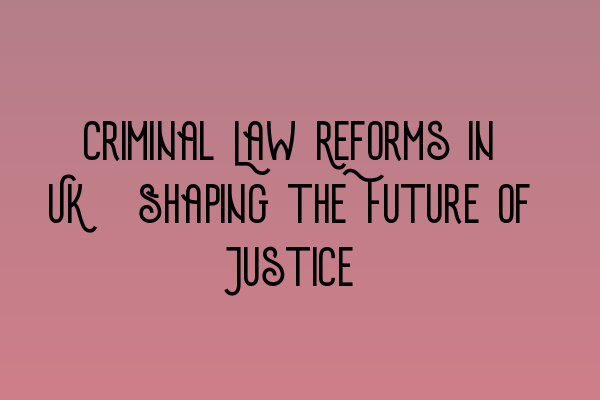Criminal Law Reforms in UK: Shaping the Future of Justice
The landscape of criminal law is constantly evolving, and the UK is at the forefront of implementing reform measures to ensure that justice is served effectively and efficiently. These reforms not only aim to streamline legal processes but also strive to protect the rights of individuals and promote a fairer and more just society. In this article, we will explore some of the key criminal law reforms in the UK and their impact on the future of justice.
The Importance of Criminal Law Reforms
Criminal law plays a vital role in society, as it sets the standards for behavior, establishes the boundary between acceptable and criminal conduct, and ensures that those who breach these boundaries are held accountable. However, as societal norms and challenges change, the law must adapt to address emerging issues effectively. Criminal law reforms provide an avenue for updating legislation, processes, and procedures to better tackle contemporary problems and enhance the overall effectiveness of the justice system.
Criminal law reforms not only serve to strengthen law enforcement and prosecution but also focus on the rights and protections of defendants. These reforms aim to strike a balance between upholding justice and safeguarding individual civil liberties – a crucial aspect of any fair and just legal system.
Key Criminal Law Reforms in UK
1. Sentencing Reform
One significant area of criminal law reform revolves around sentencing. The UK has recognized the need for proportionate sentencing, rehabilitation, and reducing reoffending rates. Various reforms have been introduced to achieve these goals, such as the development of community-based sentences, restorative justice programs, and the introduction of new guidelines for judges to ensure consistent and fair sentencing practices. These reforms aim to strike a balance between punishment and rehabilitation, ultimately reducing the burden on the criminal justice system and promoting effective reintegration of offenders into society.
2. Digital and Cybercrime
With the rapid advancement of technology, criminal activity has expanded into the digital realm. To address this growing issue, the UK has implemented criminal law reforms specifically targeting digital and cybercrime. These reforms include the creation of specialized units within law enforcement agencies, the expansion of cybercrime legislation, and the enhancement of investigative techniques to combat cyber threats effectively. By staying ahead of cybercriminals, these reforms strive to protect individuals, businesses, and national security from the ever-evolving world of digital crime.
3. Victim’s Rights
Criminal law reforms in the UK also place a significant emphasis on protecting and supporting the rights of victims. Victims of crimes often face immense physical, emotional, and financial burdens. These reforms aim to ensure that victims are treated with compassion and provided with the necessary support throughout the criminal justice process. Reforms include the establishment of dedicated support services, training for professionals working with victims, and the introduction of measures to improve communication and engagement with victims. By elevating the rights and support for victims, these reforms contribute to a more inclusive and victim-centered justice system.
Future Implications
The ongoing criminal law reforms in the UK have far-reaching implications for the future of justice. By modernizing and adapting legal processes, the UK is better equipped to handle emerging challenges and maintain public trust in the justice system. The reforms also contribute to a more efficient and cost-effective system, reducing the strain on resources and improving overall effectiveness.
As the UK continues to fine-tune its criminal law framework, it remains important to stay abreast of these reforms to navigate legal matters effectively. Organizations such as SQE Criminal Law & Practice Law UK provide expert advice and representation to help individuals and businesses navigate the complexities of criminal law. For more information, you can visit their website and learn about their services in legal representation for Delaware LLCs in the UK.
Aspiring solicitors hoping to specialize in criminal law should also be aware of the essential study materials for SQE exam preparation. The Solicitors Qualifying Examination (SQE) is a comprehensive assessment that tests both legal knowledge and practical skills required for solicitors’ qualification. By utilizing the right study materials and preparation strategies, aspiring solicitors can improve their chances of success in the SQE exam.
Expert testimonies play a crucial role in building strong criminal cases. If you are interested in learning more about this topic, you can read about the importance of expert testimonies in UK courts. Expert witnesses provide specialized knowledge and opinions that can strengthen a case and provide crucial insights to the court.
For international lawyers looking to practice criminal law in the UK, understanding the challenges and success strategies for the SQE exam is essential. You can find valuable information on this topic in the article SQE exam for international lawyers: challenges and success strategies. By acquainting themselves with the unique requirements and exam format, international lawyers can better prepare for this significant milestone in their legal career.
Conclusion
Criminal law reforms in the UK are shaping the future of justice, ensuring a more effective, efficient, and fair legal system. These reforms touch various aspects of criminal law, including sentencing, digital and cybercrime, and victims’ rights. By addressing emerging challenges, protecting individual rights, and promoting rehabilitation, the UK is paving the way for a brighter and more just future. To navigate criminal law matters effectively, it is essential to seek expert advice and representation from SQE Criminal Law & Practice Law UK.
